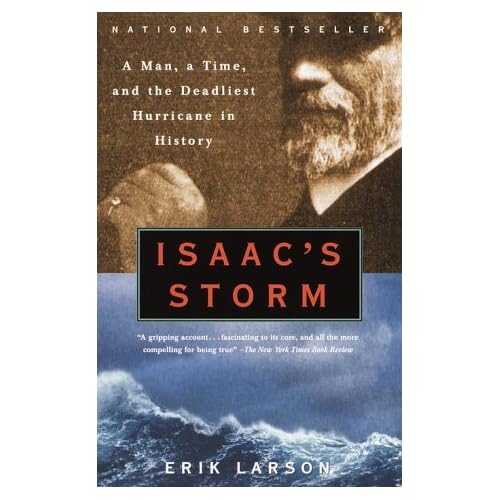
Book Review: Isaac’s Storm
Isaac’s Storm is about the devastating Galveston hurricane of 1900, Â the nascent National Weather Service … and their spectacular and criminal incompetence.
Isaac Cline was the man in charge of the weather station in Galveston, Texas. He deserves some, but not all of the blame for the tremendous and unnecessary loss of life. More of the blame goes to a system run by egotistical, empire building, bureaucrats.
 This book, unlike Larson’s Devil in the White City or Thunderstruck, does not revolve around a famous murder, but rather focuses in on the way things were at the turn of the century, and just how superior men of science considered themselves to be. It is an interesting depiction, similar to the treatment given by Paul Johnson in Modern Times. The word that best depicts this is: hubris.
This book, unlike Larson’s Devil in the White City or Thunderstruck, does not revolve around a famous murder, but rather focuses in on the way things were at the turn of the century, and just how superior men of science considered themselves to be. It is an interesting depiction, similar to the treatment given by Paul Johnson in Modern Times. The word that best depicts this is: hubris.
The leadership of the National Weather Service was so intent on being the sole source of weather reporting and forecasts, that they took extreme measures to shut down capable and qualified weather service people in Cuba, whom they belittled as uneducated and unqualified. They went so far as to coerce the telegraph company to refuse transmission of weather reports from them. The Cubans tried in vain to warn those in the path of the hurricane. After the fact, those at the head of the weather service denied the warnings, and claimed it was for a different storm.
Sadly, Isaac himself paid a high price for his pride. His wife was one of the thousands (more than 8,000) of victims of this cataclysmic storm.
The book is similar to the aforementioned books, in that it is a study of the time as well as of the actual event. What stood out most to me was the sense that we don’t have a monopoly of scummy bureaucrats in our time. Willis Moore and William Stockman were real pieces of work. The former created a system of cronyism and patronage in the Weather Service, and Stockman was a toady who delighted in producing reams of useless memos. A quote from one of the top scientific lights of the weather bureau had this to say about the Havana station chief:
“… I am constrained to say that if the Official in charge of Havana could curb a tendency toward verbosity and avoid iteration and reiteration in successive communications of matter that is irrelevant and immaterial to the subject heads, a great deal of time and labor would be saved both at Havana and the Central Office.”
This is from the guy that did his utmost to ignore the pleas of the Cuban weathermen to warn Galveston.
The book confirmed my dislike for government bureaucrats, but there was much more to it than a meticulously researched indictment of the early weather service. It was a snapshot of life at the turn of the 20th century.
 The posts are coming!
The posts are coming!


0 comments
Kick things off by filling out the form below.
Leave a Comment